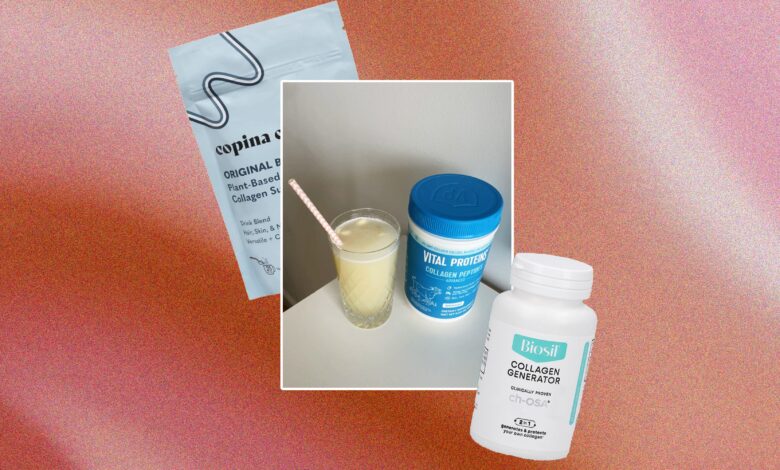12 Best Collagen Supplements That Work, Tested and Reviewed 2025

All products are independently selected by our editors. If you buy something, we may earn an affiliate commission.
So, you keep seeing buzzy brands on your feed claiming to be the best collagen supplements for women, and you’re wondering, “Do these pills, powders, and gummies actually make my skin more radiant or strengthen my nails?” Well, the answer is a little complicated. While some experts say that collagen—the main structural protein in the skin—gets digested in our gut and therefore can’t really impact aging skin or overall health, others tell us that it can help with skin elasticity and wrinkles, plus joint health (more on that below). We spoke with dermatologists and registered dietitians for their recommendations on top-rated collagen products, then tested them ourselves. After a rigorous review process, we chose Vital Proteins Collagen Peptides as our top choice overall, because it was backed by multiple experts we surveyed, plus our testers said it was easy to take and they noticed improvements in skin health. Here’s what the pros have to say about the other top-rated collagen supplements you can trust to add to your morning coffee or shake.
The best collagen supplements, at a glance
- Best Overall: Vital Proteins Collagen Peptides, $43
- Best for Hair Growth: BioSil Collagen Generator, $35
- Best for Joints: Further Food Unflavored Collagen Peptides Powder, $25
- Best for Skin: Revive Collagen Enhanced Plus, $80
1. Best Overall: Vital Proteins Collagen Peptides
Vital Proteins Collagen Peptides
Original image by Glamour commerce director Brie Schwartz
Used by the likes of Jennifer Aniston, Vital Proteins holds up to the hype—and many of the derms and RDNs we surveyed recommend this top-rated powder. This particular one contains collagen peptides, which are easier for the body to absorb than other forms of the protein. What’s more, “it’s easy to find, good quality, and blends well,” says registered dietitian Jessica Cording, MS, RD, a health coach based in NYC. Plus, it contains protective vitamin C and skin-hydrating hyaluronic acid, which can “suppress wrinkles” and improve dry skin when ingested, per a 2021 study.
Glamour commerce director Brie Schwartz is a fan of this pick. “The taste is inoffensive. It’s a bit creamy—almost like a light milk. I’ve put in my iced coffee, but that adds a bit of an after taste. So I prefer to just slug it down with water. It does require a lot of stirring to get the clumps to dissipate, though, and I’ll note that it gets really sticky on your fingers once it’s mixed with liquid, but that’s a simple solve. Overall, it’s easy to get down, which I can’t say for a lot of the other supplements I’ve tried. Also, if you’re looking for something that helps the GI, like a fiber supplement, several friends have noted that this does the trick quickly. I haven’t used it long or consistently enough to see impactful results yet, but my skin does seem a bit fuller—less tired looking—after a few weeks.”
Collagen per serving: 20g / Collagen source: Bovine / Form: Powder / Key ingredients: Collagen peptides, hyaluronic acid, vitamin C
- Pros: Whole30-approved; no artificial sweeteners; easy to absorb
- Cons: Only available unflavored
2. Best Value: Ancient Nutrition Multi-Collagen Protein
Ancient Nutrition Multi-Collagen Protein
Original image by Glamour reviewer Kristen Reed
“[This powder] contains 10 types of collagen from four different sources, including a proprietary fermented eggshell membrane collagen to support skin, joint, and gut health,” says Hadley King, MD, a board-certified dermatologist who specializes in medical and cosmetic dermatology in NYC. It’s also formulated with probiotics and vitamin C, she notes, which support digestion and provide antioxidant properties, respectively.
Kristen Reed, RN, a board-certified registered nurse and certified health coach, personally uses this collagen every day. “I love that it’s tasteless and odorless. I typically add two scoops to my morning smoothie, and I also mix it into soups, chili, tea, or warm water with lemon to kickstart my morning,” she says. “I’ve noticed (and my clients have, too) stronger hair (especially postpartum), clearer skin, and less hip and back pain.”
Collagen per serving: 20g / Collagen source: Bovine, avian, marine / Form: Powder / Key ingredients: Fermented eggshell membrane collagen, SBO probiotics, vitamin C
- Pros: High dose of collagen; gut-supporting ingredients
- Cons: Potential allergens from eggs
3. Best for Hair: BioSil Collagen Generator
BioSil Collagen Generator
Original image by Glamour reviewer Kristine Thomason
This collagen-building capsule comes highly recommended by Dr. King. It’s meant to support various important proteins in the body: “It’s formulated with choline-stabilized orthosilicic acid [ch-OSA] to stimulate collagen, elastin, and keratin production,” she says. “It also prevents existing collagen from degradation. There have been numerous clinical trials published in peer-reviewed medical journals that have shown significant results when taken, and noted improvements in skin elasticity, wrinkles, and fine lines.”
Collagen per serving: None / Collagen source: NA / Form: Capsule / Key ingredients: ch-OSA
- Pros: Vegan; easy-to-swallow capsules
- Cons: Does not contain collagen
4. Best Post-Workout: Nature’s Sunshine Collagen Powder
Nature’s Sunshine Collagen Powder
Original image by Glamour reviewer Emily Thomason
With a combo of Type I and Type III grass-fed collagen, this powder has an impressive 15 grams of protein. Plus, it includes an electrolyte blend, which is great for supporting hydration and recovery post-workout. “During my weight loss journey, I started losing some of my hair because my protein intake was pretty low,” says Glamour tester Emily Thomason. “But when I started taking this collagen powder, I noticed my hair getting stronger, plus it helped me meet my protein goals.” She notes that while it doesn’t dissolve seamlessly in water, she loves adding it to post-workout smoothies for an extra protein and electrolyte boost.
Collagen per serving: 17g / Collagen source: Collagen peptides/ Form: Powder / Key ingredients: Collagen peptides, electrolyte blend
- Pros: Minimal ingredients; research-backed form
- Cons: No additional beneficial ingredients
5. Best for Coffee: Copina Co. Original Vegan Collagen Booster Creamer Mix
Copina Co. Original Vegan Collagen Booster Creamer Mix
Original image by Glamour reviewer Neha Tandon
Glamour contributor Neha Tandon loves Copina’s plant-based collagen blends—specifically, the vanilla flavor for her chai beverages and the cacao for coffee. “It adds this nice nutty flavor,” she says. “I’ve also been using it every day for about three months, and I notice my skin looking a lot more glossy and plump. I don’t think it’s a coincidence! I’ve even been getting compliments from friends asking how I’ve switched up my skin care routine.” This plant-based formula features ingredients like biotin, bamboo leaf extract, organic tremella mushroom fruiting body extract, gotu kola whole-plant extract, and amla berry—formulated to help support collagen production.
Collagen per serving: 405mg / Collagen source: NA / Form: Powder / Key ingredients: Biotin, bamboo leaf extract, organic tremella mushroom fruiting body extract
- Pros: Plant-based; added hyaluronic acid
- Cons: Does not contain collagen
6. Best Marine Collagen: Vital Proteins Marine Collagen
Vital Proteins Marine Collagen
Original image by Glamour reviewer Kristine Thomason
For anyone who follows a pescatarian diet and doesn’t eat meat or animal products from cows, marine collagen is another option for supporting skin, hair, gut, and overall health, says Ruvini Wijetilaka, MD, a board-certified internal medicine physician and provider at Parsley Health. Vital Protein’s Marine Collagen has a solid amount of protein (11 grams, to be exact), along with 12 grams of collagen peptides derived from the scales of non-GMO Certified, wild-caught cod.
“I was a pescatarian for nearly a decade, which presented a bit of a challenge when it came to finding a collagen supplement to take,” says Glamour contributor Kristine Thomason. “But when I learned that marine collagen existed, I was thrilled. And, much to my relief, this collagen powder doesn’t have a fishy taste—in fact, it has a nice, mild flavor, and dissolves easily in water or smoothies. I also noticed that my nails (which often break the moment they start growing) started to get thicker and stronger after continuous use.”
Collagen per serving: 12g / Collagen source: Marine collagen from cod / Form: Powder / Key ingredients: Hydrolyzed marine collagen
- Pros: Mixes easily with any liquid; pescatarian-friendly; non-GMO and made from wild-caught fish
- Cons: Contains slightly less protein than Vital Proteins’ bovine formula
7. Best for Joints: Further Food Unflavored Collagen Peptides Powder
Further Food Unflavored Collagen Peptides Powder
This collagen peptides powder contains two forms of collagen (types I and III)—but it gets even better. The hydrolyzed collagen peptides in this product come from the highest quality grass-fed and pasture-raised bovine. “When the animals are pasture-raised and eat an ancestral diet, the collagen is more nutrient dense and has more skin, hair, and joint benefits for humans,” says Celeste Thomas, RN, a holistic skin care expert based in Los Angeles. She’s been taking this powder for years and has noticed significant improvements. “The most striking change was how fast my nails and hair grow, and how thick my nails are,” she says. “Based on my visible nail and hair results, I believe that the amino acids from the collagen powder are supporting the collagen production mechanism of my skin.”
Collagen per serving: 20g / Collagen source: Bovine / Form: Powder / Key ingredients: Hydrolyzed bovine collagen peptides
- Pros: Hydrolyzed collagen; grass-fed, pasture-raised bovine
- Cons: No additional beneficial ingredients
8. Best for Skin: Revive Collagen Enhanced Plus
Revive Collagen Enhanced Plus
This travel-friendly collagen option is a favorite of Ariana Yaptangco, Glamour senior beauty editor. “Since I started taking this marine collagen supplement, I’ve noticed my hair looks shinier and my nails feel stronger. Jury’s out on whether or not it’s because of my new haircut or the fact that I’m taking an break from gel manicures, but something tells me it’s a little bit of both. In addition to collagen, these sachets include essential vitamins like vitamin B6, B12, C, and D3 to support overall health. Think of it as killing two birds with one stone. Best of all, it actually tastes good, unlike other ingestible collagen supplements I’ve tried. Pro tip: Store them in the refrigerator for a chilly treat.”
Collagen per serving: 22ml / Collagen source: Marine collagen from fish skin / Form: Powder / Key ingredients: Hydrolysed Marine Collagen, vitamins C, B6, D3, B12, and A (Retinol)
- Pros: Great taste (Stevia); absorbs into drinks easily
- Cons: Only 14 days worth of product; pricey;
9. Best Collagen Capsule: Now Foods BioCell Collagen Capsules
Now Supplements BioCell Collagen
Maggie Moon, MS, RDN, a registered dietitian, is a big fan of Now Foods collagen products, calling them a “reputable brand with a long track record for high quality standards and testing.” She often recommends their BioCell Collagen to anyone who prefers a capsule over a powder. She loves how accommodating this product is to so many dietary needs. “It’s dairy-free, egg-free, nut-free, soy-free, gluten-free, halal, and non-GMO, for anyone who prefers or needs to be aware of these characteristics,” she says. What’s more, it contains hyaluronic acid, which may support skin health and hydration.
Collagen per serving: 1 g / Collagen source: Hydrolyzed chicken sternal cartilage extract / Form: Capsule / Key ingredients: Hydrolyzed type II collagen, hyaluronic acid
- Pros: Accommodating of dietary needs; added hyaluronic acid
- Cons: Only contains type II collagen
10. Best Vegetarian Collagen Supplements: TruSkin Collagen Boosting Skin Supplement
TruSkin Collagen Boosting Skin Supplement
This vegetarian option is another favorite of Dr. King’s. She particularly loves that it contains a spectrum of good-for-you components, including eggshell membrane vitamins C, E, and B7 (biotin); plus a superfood blend of asparagus, okra, pomegranate extract, mangosteen, acai, camu camu, quercetin, acerola, and coffee fruit extract. What’s more, “in their study, after 50 days, 100% of participants reported improvement in facial wrinkles,” says Dr. King
Collagen per serving: None / Collagen source: Ovoderm collagen types I, V and X / Form: Capsule / Key ingredients: Eggshells, pomegranate extract, coffee fruit extract, biotin
- Pros: Vegetarian; no artificial sweeteners; contains superfoods
- Cons: Only contains vegetarian collagen types
11. Best Prenatal Collagen Powder: Needed Prenatal Collagen Protein
Needed Prenatal Collagen Protein
For Irena Kutza, MS, RD, CDN, a clinical administrative dietitian at Montefiore Health System, Needed Prenatal Collagen Protein powder ticks all the right boxes: It’s third-party tested, and made using grass-fed and pasture-raised bovine collagen. Plus, it’s a safe option for pregnancy, nursing, and even afterward—you don’t have to be pregnant to take it. It simply assists with meeting your protein quota and supporting healthy fetal-cell growth. When it comes to fighting postpartum hair loss, this collagen supplement can be a solution, and can also keep up your protein intake if you’re nursing. On top of all that, the taste is good, according to Kutza: “Not only does it meet all my requirements, but it also dissolves very easily in warm and cold beverages without gelatinizing, making it easy to add to any beverage.”
Collagen per serving: 15g / Collagen source: Bovine collagen / Form: Powder / Key ingredients: Hydrolyzed bovine collagen
- Pros: Minimal ingredients; safe for preconception, pregnancy, postpartum, and beyond; non-GMO
- Cons: Available only via subscription
12. Best Quick-Dissolving: Besha Inc Verisol Collagen Bioactive Peptides
Besha Inc Verisol Collagen Bioactive Peptides
This collagen product from German company Besha comes highly recommended by Moon. “I like that its collagen has the best research-backed evidence to help with aging skin issues, like crow’s feet, skin elasticity, and thigh cellulite,” she says. “Plus it’s versatile since it’s tasteless and stirs into cold and hot drinks well, thanks to its low molecular weight.”
Collagen per serving: N/A / Collagen source: Verisol Collagen / Form: Powder / Key ingredients: Pure natural collagen powder Verisol
- Pros: Minimal ingredients; research-backed form
- Cons: No additional beneficial ingredients
All your collagen supplement questions, answered
What exactly is collagen?
Collagen is the most abundant protein in your body. It provides structure to your skin, hair, nails, joints, ligaments, connective tissue, muscles, and bones. So far experts have identified 28 various types of collagen, according to research published by the National Institutes of Health. The most common are types I, II, and III, with type I making up 90% of collagen in the human body.
Our bodies naturally produce collagen, but production decreases due to a number of factors (age, sun damage, smoking, etc.). That’s where a supplement may be enticing: “Individuals experiencing signs of aging such as wrinkles and joint pain, or those with a collagen deficiency, may find them beneficial,” Anna Chon, MD, a board-certified dermatologist in Miami, tells Glamour.
You can also elevate your levels of collagen with collagen-rich foods like bone broth, chicken, turkey, and salmon.
Do collagen supplements actually work?
“The jury is still out as to whether or not [collagen supplements] truly have any benefits, and there’s a lack of consistency in quality and efficacy among the product and manufacturers,” says Nava Greenfield, MD, a board-certified dermatologist at Schweiger Dermatology Group in New York City. It’s also important to note that while collagen is a protein, it’s not complete (meaning, it doesn’t contain all essential amino acids), and therefore it can’t fully replace something like a protein powder.
Other experts, however, say that supplements may be a helpful addition to your health and skin-care regimen. “I recommend collagen supplements to individuals with noticeable signs of skin aging, those with joint pain related to osteoarthritis, and those who are unable to get sufficient collagen from their diet,” says Cameron Rokhsar, MD, FAAD, FAACS, a board-certified dermatologist and associate clinical professor of dermatology at Mount Sinai Hospital in New York. If you have mature skin, you can also use a collagen-based cream, just make sure it has anti-aging ingredients like peptides and retinol.
What are the benefits of collagen supplements?
“It’s still undecided whether collagen is actually effective when we consume it,” Hadley King, MD, a board-certified dermatologist who specializes in medical and cosmetic dermatology in New York City, tells Glamour. Collagen supplements have garnered some healthy skepticism among skin-care experts and doctors, who believe the supplements may get degraded during the process of digestion in the GI tract. Still, there is recent research on collagen supplements that is promising.
One 2019 review of current research found that collagen consumption may offer short- and long-term benefits for skin elasticity, hydration, and wrinkling—the foundation of antiaging skin care. Other small studies suggest that collagen supplementation may help alleviate joint pain and support nail strength. Beyond those suggested cosmetic benefits, a 2021 review also highlighted that collagen products had a “significant” impact on skin regeneration, wound healing, dental therapy, joint health, and osteoarthritis. So while she is optimistic about the research and anecdotal evidence, Dr. King says, “We still need to conduct further studies to confirm these findings and to determine optimal dosing regimens.”
What to look for in a collagen supplement
If you’re interested in trying collagen supplements for beauty and health benefits, here are some clear criteria from Dr. Chon—in consensus with multiple other dermatologists Glamour surveyed—to consider before buying:
Type of collagen
Again, there are 28 types of collagen, but the ones most frequently used in supplements are types I to III—mimicking the most common forms of collagen found in the human body. Types I and III are good for supporting healthy skin, hair, and nails; type II collagen is ideal for joints and cartilage. Collagen type I can help support overall skin health and address complexion concerns such as sagging skin.
Collagen source
Collagen is typically derived from bovine (cow) or marine (fish) sources. Dr. King recommends seeking out collagen products sourced from organically raised animals whenever possible. Collagen is not vegan; per a 2020 review, the protein “originate[s] from animal sources” and therefore cannot be plant-based; if you have dietary restrictions or allergies, this is an important factor to consider. However, you can find vegan formulas that help stimulate your body’s own collagen production. (Researchers have used genetically engineered microorganisms to create what is essentially vegan collagen, according to recently published research, but no product using this technology is available to consumers.)
Form
Collagen supplements come in various forms, including powders you can stir into water or coffee, capsules, and liquids. Hydrolyzed collagen and collagen peptides have been broken down into smaller molecules, which are easier for your body to absorb and incorporate toward skin, hair, and nails. According to Kseniya Kobets, MD, director of cosmetic dermatology at Montefiore Advanced Care, you can get the most benefits from at least 2.5 grams daily, as most studies show; however, 10 to 12 grams of collagen provide the maximum perks for your skin, joints, and hair.
Ingredients
Try to avoid products with added sugars or artificial flavors and colors. Do keep an eye out for health- and skin-supporting ingredients, like vitamin C and hyaluronic acid.
Thorough testing and vetting
Look for products that have been tested for purity and safety by a trusted third party. This third-party certification ensures that the supplement contains exactly what it claims to offer, with no filler or harmful contaminants. It’s also beneficial to seek out brands that conduct clinical trials on their products, offering data on each one’s potential efficacy. Making sure that bovine sources of collagen are pasture-raised and grass-fed is also important to determine trustworthiness and sustainability. “Look for labels that are certified by the American Grassfed Association (AGA) to ensure the supplement is antibiotic- and growth-hormone-free,” says Dr. King. And on top of that, do some research on each brand, prioritizing ones that are well-established, transparent about their sourcing and production processes, and liked by customers.
How long does it take for collagen to work?
While collagen supplements are not a magic bullet for a plump complexion and luscious hair, you may be able to see some results within about a month, according to some studies. “Multiple meta-analyses have shown improvement in skin hydration, elasticity, and wrinkles, evident as early as four weeks, but usually at 60 to 90 days after starting supplementation and maintained for at least 40 days after stopping,” says Dr. Kobets. It’s a good idea to check in with your doctor or nutritionist after two to three months on any progress you might be making with collagen supplementation.
What is the downside of taking collagen?
In general, collagen is safe to take. Since it’s a protein that’s usually derived from animal products, it typically doesn’t have any major interactions with other vitamins or medications, says Irena Kutza, MS, RD, CDN, clinical administrative dietitian at Montefiore Health System in Bronx, New York. Often, though, collagen supplements contain other additives to aid absorption, including vitamin C, which can interact with certain medications such as estrogen or blood thinners, Kutza points out. And, excess amounts of collagen may lead to some unpleasant GI symptoms.
No matter what, be sure to speak with your doctor before taking any new supplements. A health care practitioner can offer personalized advice, based on your individual dietary needs and preferences. “While collagen supplements may offer potential benefits, they should not be a substitute for a balanced diet and a healthy lifestyle,” says Dr. Chon. “It’s also important to remember that individual responses to supplements can vary, and what works for one person may not work for another.”
To determine the best collagen supplements, we considered all of the expert-outlined criteria above, including type, collagen source, form, key ingredients, and third-party testing. We also compiled expert-recommended supplements, and then tried them ourselves consistently over the course of a month or until the product ran out. Our Glamour testers evaluated each supplement based on taste, texture, quality of ingredients, and perceived efficacy.
- Kseniya Kobets, MD, director of cosmetic dermatology at Montefiore Advanced Care
- Anna Chon, MD, a board-certified dermatologist
- Hadley King, MD, a board-certified dermatologist
- Nava Greenfield, MD, a board-certified dermatologist
- Cameron Rokhsar, MD, FAAD, FAACS, a board-certified dermatologist and associate clinical professor of dermatology
- Maggie Moon, MS, RDN, a registered dietitian
- Ruvini Wijetilaka, MD, a board-certified physician of internal medicine
- Jessica Cording, MS, RD, a registered dietitian and health coach
- Kristen Reed, RN, a board-certified registered nurse and certified health coach
- Irena Kutza, MS, RD, CDN, clinical administrative dietitian at Montefiore Health System


